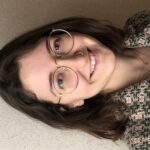 Chiara Dal Farra is a research fellow at the University of Milano-Bicocca. In 2020, she obtained her PhD in Language Sciences at Ca’ Foscari University of Venice with a thesis entitled “To be or not to be an island. The status of adjuncts” under the supervision of Alessandra Giorgi.
Chiara Dal Farra is a research fellow at the University of Milano-Bicocca. In 2020, she obtained her PhD in Language Sciences at Ca’ Foscari University of Venice with a thesis entitled “To be or not to be an island. The status of adjuncts” under the supervision of Alessandra Giorgi.
Her main research interests include different aspects of syntax, such as the establishment of dependencies and cases in which these are blocked: islands. During her PhD she mainly focused on adjuncts, from both and experimental and a theoretical point of view. She is also interested in focalization, the topic of her MA thesis in Theoretical Linguistics at Ca’ Foscari, and in syntax-pragmatics interface, as in the case of special questions. For the latter, she focused also on co-speech gesture and on prosodic properties.
Since 2021, Chiara is part of the European project LeibnizDream (Realizing Leibniz’s Dream: Child Language sas Mirror of the Mind).